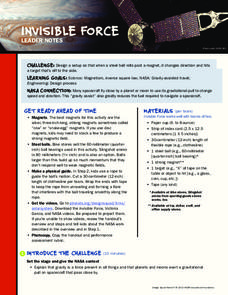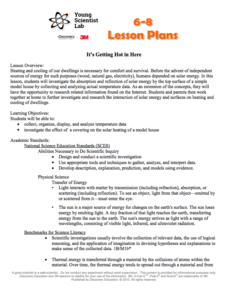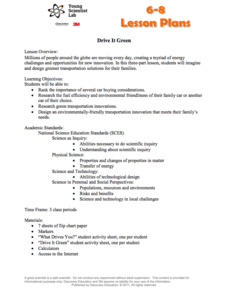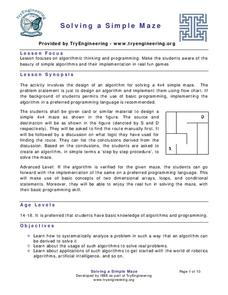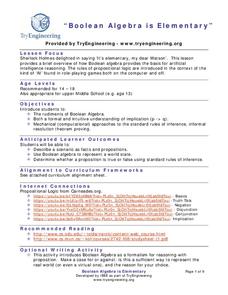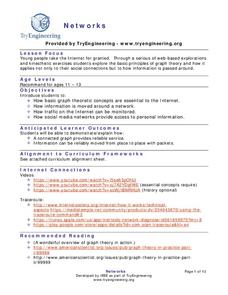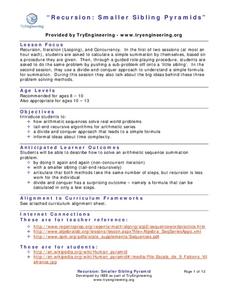Virginia Department of Education
Greetings
Welcome learners to the world of algebra. Use a lesson that poses a situation involving the profit from creating greeting cards to teach about algebra. It requires scholars to use linear functions and inequalities to solve problems.
Virginia Department of Education
How Much is that Tune?
Tune in for savings! Scholars investigate pricing schemes for two different online music download sites. After comparing the two, they determine the numbers of songs for which each site would be cheaper.
PBS
Invisible Force
Investigate invisible forces. Young engineers design a setup that changes the direction of a steel ball using a magnetic force. The purpose of the setup is to model the gravitational pull of spacecraft by planetary bodies.
PBS
Inspector Detector
How do spacecraft detect magnetic fields? The fourth installment of a five-part unit has learners develop a device with magnets that allows for the detection of magnetic fields. They use a map of an imaginary planet to try out their...
PBS
Robo Arm
Future engineers create robotic arms like those on rovers built by NASA in the second lesson plan of the series. They test their devices by attempting to pick up and move cups to a specified location.
Tech Museum of Innovation
Launch It!
Launch a activity on flight with a challenging resource that asks scholars to first brainstorm and test ways to move a ping pong ball with given materials, then apply the results to design a launcher for them.
Tech Museum of Innovation
Hoop Glider Design Challenge
The fourth installment of a five-part unit has young engineers designing and testing hoop gliders. They adjust the ratio of the front loop and back loop of the glider to determine the best design for the longest flight.
Tech Museum of Innovation
Engineering Takes Flight
Groups explore concepts of flight by creating paper airplanes from different types of paper and testing their flight. They use the results to identify the optimal material.
Tech Museum of Innovation
Seed Dispersal
Engineering challenges are not just man-made ... nature has its own set of them. A hands-on STEM activity has groups designing a seed dispersal system. Each group can only use one sheet of paper — a tough task!
Energy for Keeps
Renewable Energy Action Project: What's in Your Energy Portfolio?
Uncover the renewable energy potential in your region. The activity outlines an approach to research current practices and trends. Learners conduct surveys to assess the attitudes of the local population and prepare a paper summarizing...
Georgian Court University
Introduction to Marsh Ecology
Compare and contrast the characteristics of fresh and salt water marshes. After exploring the typical plants and animals found in each marsh type, participants use a set of flash cards to sort into fresh and salt water marsh life. Their...
Tech Museum of Innovation
Analogous Models
What goes into a museum display? A secondary-level STEM project prompts groups to design a museum display for the Tech Museum of Innovation. They create an analogous, interactive model illustrating a science concept to complete the lesson.
Discovery Education
It's Getting Hot in Here
Class members engage in a STEM experiment and investigate how materials affect heating in a house by creating models of houses and using different top surface materials. They record the temperature inside the models and consider what the...
Discovery Education
Drive it Green
Explore and brainstorm innovations for cars with a STEM lesson that asks scholars to weigh different options when considering when buying a car. They research the fuel efficiency and carbon emissions for various options, and then design...
Discovery Education
Cushion It!
Sugar cubes, collide! Groups design protection systems using bubble wrap to protect sugar cubes from being destroyed by falling batteries in the STEM instructional activity. They consider how the experiment relates to collisions in...
Discovery Education
Make it all Better!
Discover how innovations can help your school and community. In the three-part STEM lesson, scholars learn the meaning of innovation and brainstorm innovations in their schools. They identify issues in their communities and think of...
Balanced Assessment
Smaller, Larger, In-Between
Build a solid understanding of rational number relationships by asking class members to use various skills to order decimals, fractions, and numeric power expressions. Using the resource, they find that the fractions do not have an...
Intel
Beat the Heat
Explore greenhouse effect and climate change through a 15-day unit. Scholars learn about these STEM concepts by researching, conducting surveys, experimenting, and collaborating with experts in the field. They frequently communicate...
TryEngineering
Solving a Simple Maze
Solve a maze ... from a robot's point of view. In the instructional activity, your scholars build a small, simple maze from cardboard and then find a route from the start point to the finish point. They write an algorithmic process that...
TryEngineering
Arduino Blink Challenge
Who knew turning a light on and off could be so complicated? In the lesson plan, pupils use Arduino boards to learn about computer codes and programs. They program an Arduino to make a light turn on and off at certain time intervals.
TryEngineering
Boolean Algebra is Elementary
See how Boolean algebra relates to video games with a lesson that teaches young scholars how to use Boolean algebra to create rules for a virtual world. They test the rule base for consistency in groups.
TryEngineering
Graphics: Bits and Points
What can a mural teach pupils about computer science? The lesson has scholars create a mural on a wall to learn about bitmap and vector graphics. Along the way, they learn about the graphics coordinate system.
TryEngineering
Networks
Ever wonder how the Internet works? The lesson teaches scholars the basics of graph theory and how it applies to the Internet. They perform simulations to see how information is sent on the Internet.
TryEngineering
Recursion: Smaller Sibling Pyramids
Get siblings to do your work. Scholars learn how to perform summations of arithmetic sequences in an innovative lesson. They use iterations, smaller siblings (tail-end recursion), and the divide-and-conquer approach.




